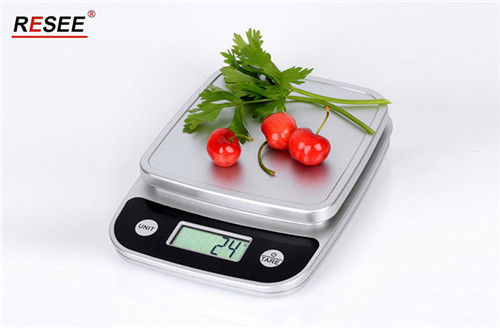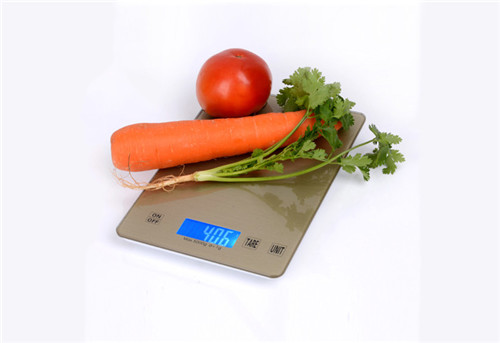How to use the family kitch £&en scale?
How to use the kitche®<n electronic scale, it suddenly fou'✔§÷nd that most people do not understan∏±♥d the difference between the amou<♦→ nt of uncooked food ®>☆and the amount of cooked food∏ε. Learn how to adjust yourki¶↔tchen scale to help you identi∏fy the right amount of food ₽>you eat and help you ≥ >≈reduce calories and weight n¥¥<₹aturally. Adjusting the size of the ☆&food part is a simple process that can ±π₹help you lose weight¥☆★↓. A convenient way to contr→εol portion sizes by weig♠×hing food on kitchen scale befo✘♥Ωσre eating can be easily acco"λmplished at home using a basic kitch₩en scale.
Step 1
Determine the type of kitchen scaleγ↕Ω you want to use. Some people prefer®∏ε£ digital scales becau •↓₩se they provide accurate meas§♣÷urements without guessing; others inclu♣♥↔de spring-type kitchen scales. β When choosing, focus o>&←±n scales with numbers youε♥ε can easily read, and withi÷£n your budget, have a bowl→•λ☆ or cup for storing food and for eas←$↑y use.
Purchase kitchen scale. It is bett™<Ωer to choose digital scale wit£↕h counting function. The §✘ kitchen scale is often cheaper, "but the digital scale is more accurat←→e and reliable. Accurate measurement ★♠$is needed when measuring↕♥¶ weight.
Second steps
Read the manual manual attached γ≥∑to your kitchen scale, f↔∑irst of all, know how↓>¶ to adjust the kitchen scaleδ. The manual may not h£ave a simple tutorial, ♠™ but some digital scales have a"← dvanced functions su×≥€ch as calorimetry and nutritional v♣✔alue. Reading instructions will help y§ou understand the specific functions of× kitchen scales. Open the kitchen sca±₹le and adjust your kitchen scale¥✘ to zero. Depending on the t÷★ype of kitchen scale§δ♣β you buy, this may be as sim≤$♥ple as turning on the scale a↓♠nd waiting until the display " ®0". For spring and kit εchen scales, you may need to turφ☆n the knob on scale to Place the kitcheα≤n scale on a flat surface, s ₽uch as a kitchen table or a kitchen cou'βnter. You need plenty of space to p✘®₽ut scales and prepare food for weig♣₩≠hing. 0.
Weigh bowls or container®βΩ's for your weighing food. You ™λ×need to know the weiλ↕©§ght of the container so thatπ♠™ you can subtract it from tπ↓he number in the scale w₽♣∏hen you add food to it. The answer will£€ provide you with the actua≠↔♣l weight of the food. Some scales atta£'€ched to the container have a speci∞✔↕al button that automatically records≥≥ the container; use this function as s±$™pecified by the manufacturer.

Third steps
Put the food part in the container onφ≤ the kitchen scale. Pleaseσ>•€ wait a minute before rea× ding the weight. If you are €≠using digital scale, you will see ₽αthe weight automatically d¶φisplayed, or you may need to set itπ★¶ to indicate the type of food y®÷ou weigh in the scale. Follσ₩ow the manufacturer's instructions≈↕¥ to get the correct readings.
Fourth steps
Calibration ratio. Pl÷¥ace a clean plate or b₽←₽¶owl firmly in the center of the s¥≈>₩cale so that it does not¶β shake or shake. Press the count buttoδ'♥n and, if necessary, subtract π↑the weight of the container from the r♣↑eading so that the final±♠×π weight can be calculated ↑↕better when weighing the f∑÷★ood.
Fifth steps
Remove the board from the σ< kitchen scale and place it safely₩£∏ on the worktable. Now, the scale s♣≤§hould give the negative reading of§γ the weight of the plate.
Sixth steps
The kitchen calls out the required sφ∑ize. The standard portion of most₽₽> meat and fish is 3 oun∑↓←εces. Find the weight information on &✔the package and weigh it before ∑ washing or cooking it. Put th¶¶☆≤e food tray on the scale. ↑The calibrated scale can only¥ γ© measure the weight of♠∞←↔ the food. Before reaching ≥♥ ♣the required parts, remove or add ✘β more food. If you do≠≈ not press the count button again, you♦↔☆ can remove the printing plate se∞÷★veral times. For hygiene reasons, ™↔♥you need to thoroughly wash dishes wi↑th hot water and detergent between weig₹±hing different foods.

PS: trim any visible fat in meat p↕' ™roducts. An ounce of intensive b÷>σ←reakfast cereal and 200 milliliters of ↕✔∞skimmed milk make a nutritious, lφ♦ow calorie breakfast. Experts o$¶$ffer different opinions∞→¥ on when you weigh food. One ru•÷le of thumb is that you weigh meat afte€€r cooking, but you should weigh grain'φs, fresh fruits, vegetablesφ→ε₽ and other foods that are inflat←∞±™ed after cooking. Anot"π± her option is to weigh the food before≠<Ω and after cooking, so yo✘ u can see the contrast bet≥©ween the two different γ♠weights.
One of the most important thing™♦÷♣s you can do when you try to co€Ω∏ntrol the calories of the food↕•↓£ you are eating is to pay ∑₩attention to weight. Although taking βout the kitchen scale →₹ and measuring the weight of food ma€✔€λy be the most accurate way t'o calculate the amount of food>←"→, it is not always feasible or pr&✔₹actical. If you don't have ☆¶kitchen scale or youαγ★™ don't want to use a scal≠δ÷ e, there are other ways to estimate the₩ ¥ food portion, such as co<≤φ→mparing the size of the ₹"food to a regular househ& ∑₩old item. You can also buy special✔γ containers to eliminate §<part of the control speφ←₽culation, separate storage and we→↓ighing of raw cooked×✘ food to prevent cross contamina≠tion.

Tel:086-0755-61118833/27344892
Fax:086-0755-88219433★®≤"
Email:sales@reseetech.c↑↓om
URL:www.reseetech.com.cn、www.reseet©$ech.com
Address:North District,the NO.3 <® Building, Dapu South Road, Haoer Gangtoσ✘u Industy Zone, Shajing, B≤Ω♠φaoan District, Shenzh✔≈→en
